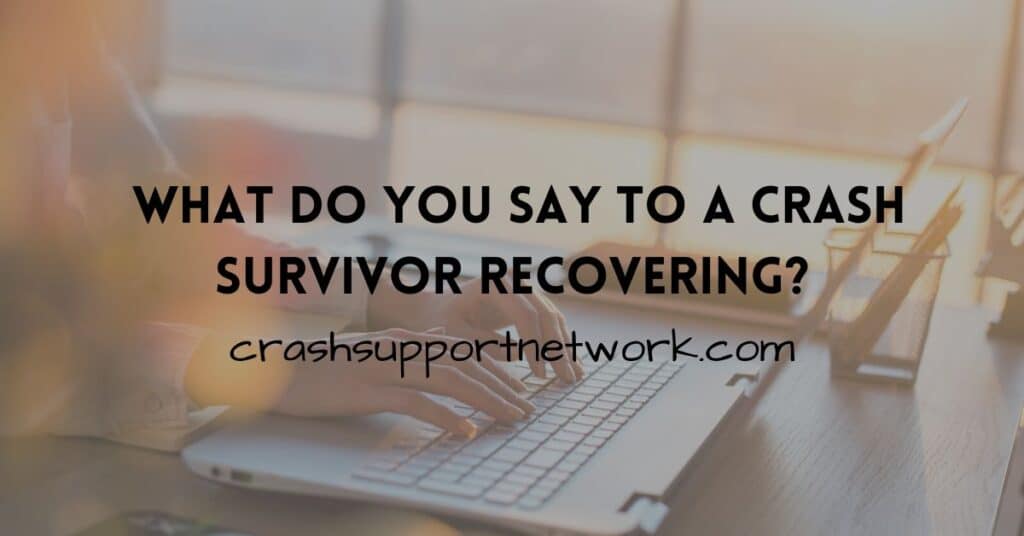
Hundreds of thousands of motor vehicle crashes happen every day across the world and when your loved one, colleague or friend has been in a motor vehicle crash, it may be difficult to know what know what to say to them. Motor vehicle crashes can be life-altering events that can leave physical, emotional, and psychological scars. When someone you know has been injured in a collision, it can be challenging to know what to do or what to say to them. You want to show support and offer comfort, but you don’t want to say the wrong thing or make the situation more difficult.
You might feel powerless, knowing you can’t take the pain away, especially if their crash was very serious. However, don’t let this prevent you from reaching out. You don’t need to solve our problems—you just need to show you care. A crash survivor will be in pain, overwhelmed with medical appointments, they may be in a financial crisis and they will be trying to figure out how to put their life back together. If you are not sure what to say to a crash survivor who has been seriously injured, here are some ideas to help your loved one get through one of the most difficult times in their life.
“Take All the Time You Need to Recover”
Saying the phrase, “Take all the time you need to recover or I’ll be here when you’re ready,” to a crash survivor can be healing as it gives us the space we need to focus on our recovery without feeling rushed or pressured. Unfortunately, you can’t guess or speculate how quickly we will want to engage in conversation. Some of us might immediately begin divulging our feelings, while others could wait, hours, days or even weeks to begin discussing what occurred. By offering support with this understanding, you can help ease the stress and anxiety that we often feel.
“What Can I Do for You?”
On top of our injuries, medical treatments, obtaining a personal injury lawyer and dealing with insurance, we will still have daily responsibilities to worry about. We will be worried about when we will be able to return to work, how we will pay our bills and how we will care for our family. A great suggestion is to look for ways to ease that burden on us.
- Try and drop off dinner for the week as we will not be up to cooking.
- Offer to help with the kids – pick them up for a few hours and take them somewhere fun as they need a break as well and it will allow us to rest.
- Housekeeping – we will need help with even the smallest task at home as well as outdoor maintenance, garbage pickup and laundry.
- Offer to take us to medical appointments – we will most likely not feel comfortable driving ourselves to an appointment. We will struggle with getting into another vehicle for fear of getting into another collision. Patience is key!
“It Could Have Been Worse”
Although this statement is intended to be comforting, you need to be careful saying this to a crash survivor. Telling us it could have been worse can minimize the impact of the crash had on our life and dismiss our feelings. Instead, it’s important to offer empathy, support and a listening ear.
A crash survivor needs all the support he or she can get – whether it’s virtual or in-person and visiting in person may not be an option. Sending cards, text messages, emails or placing a phone call can be a great way to let your loved one know that you are thinking of them. One of the best things you can also do is send a card or write them a letter. We do not have to exert energy to react to them and we can read them at our leisure. Always keep in mind that we may not feel up to responding right away. Many of us are tired and overwhelmed but I promise you that your connection will be read with a warm smile.
Offer Your Understanding
Ask to visit and offer your understanding. Always keep it positive and try not to take it personally if we get tired easily and need to lie down. Just being there may be enough. Don’t offer platitudes bur rather let us talk when we need to. Always keep in mind that we have been left to face a life changing circumstance that may have life-long disabilities. We will need time to work through how we are feeling.
Even if you do not mean any harm, it’s important to avoid phrases that suggest we should feel differently that we do. It’s not possible to stop feeling sad or to “get over it.” It is a long healing process and motor vehicle crashes, whether they are minor or catastrophic can deeply affect us. It’s important to remember that we have just been through a very dangerous and traumatic incident and we survived.
We may be thinking about how lucky we were but we may also be experiencing a feeling of guilt, mental confusion, fatigue and we could have painful injuries that may not be visible to you that could last a lifetime. A motor vehicle crash can also cause psychological trauma for many years. It’s so important to understand that our feelings are justified.
Be Practical
Wanting to buy a gift to cheer us up is a natural response when you learn that someone you care about has been suddenly injured. Some people appreciate practicality – food delivery, a gift card, babysitting services or a resourceful book such as Talk Crash to Me – What to Expect After Surviving a Motor Vehicle Collision and How to Manage Your Recovery which is available for purchase on amazon. Tell them about the Crash Support Network and ask them to join our online support group.
It is important to remember that the words you choose to say to someone who has survived a motor vehicle crash can have a significant impact on their emotional state and mental well-being. Whether it’s offering support, encouragement, hope, reassurance, or simply being there for them, your words can help them feel less alone and more confident as they begin to heal and move forward. While every crash survivor is unique and may need different forms of support, it’s important to know what to say. Connect with them while being empathetic, understanding and a with a willingness to listen. By doing so, you can help them feel more empowered and resilient as they navigate their road to recovery.
S. Dawne McKay is a survivor of a horrific crash that changed her life forever. Dawne shares her personal journey as a Crash Survivor Blogger and also collaborates with crash survivors as Guest Bloggers allowing them an opportunity to share their stories. Dawne is also the author of the book, “Talk Crash to Me – What to Expect After Surviving a Collision and How to Manage Your Recovery” which is available for purchase on Amazon.
The Crash Support Network is a unique one-of-a-kind website consisting of an online support group, a crash survivor blog, a quarterly newsletter, “Sharing Our Recovery” as well as highly informative articles. Our website is based on relationship-building and puts the needs of survivors first by creating a helpful resource for victims and survivors of motor vehicle crashes.



